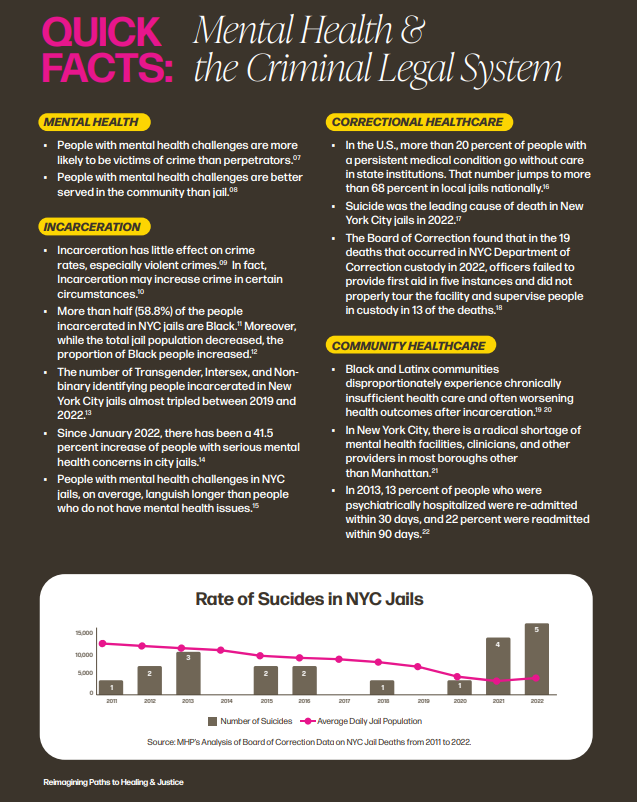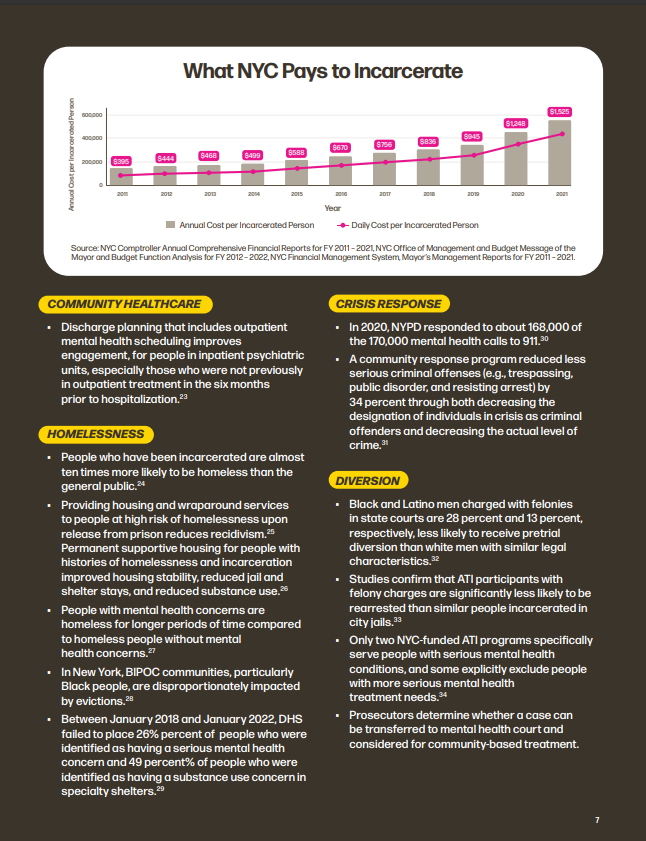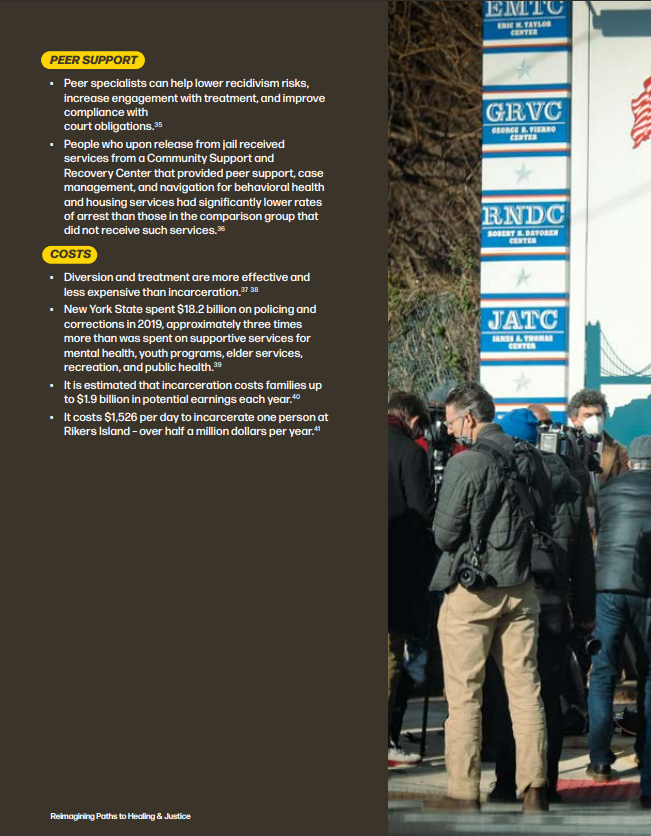Alliance Note: The Urban Justice Center’s Mental Health Project recently released a report titled ” Reimagining Paths to Health & Justice: Perspectives on Community Diversion. The report outlines the current issues in the mental health and criminal legal systems, with particular focus on where the two overlap, and offers ten recommendations to better serve people with mental health and substance use challenges and divert them from institutional settings. Although the report is centered on New York City, the recommendations to improve the systems are useful for other areas of our state and country.
Some of the recommendations offered include investing in more preventive services to address social determinants of health and social inequities, creating more effective housing models, expanding diversion services, and developing a community crisis response system similar to what Daniel’s Law Coalition and Correct Crisis Intervention Today-NYC (CCIT-NYC) advocates have been calling for.
See below to read the executive summary for the report, as well as quick facts on the Mental Health and Criminal Legal System.
Executive Summary
Throughout the country, the mental health and criminal legal systems, both independently and as cross-systems, are failing those with mental health concerns. In New York City, people with mental health concerns are: incarcerated at higher rates and endure horrendous jail conditions, which sometimes lead to death, with BIPOC, particularly Black people, bearing the most harm; over policed, oftentimes leading to living on the streets; failed by ineffective hospitalization and other supportive services; and murdered on the streets by vigilante justice.
Thus, it is not surprising that addressing the mental health crisis and diverting people with mental health needs from incarceration has become a priority for elected officials, throughout the country. In New York, many of Governor Hochul’s and Mayor Adams’ proposals to improve the mental health crisis heavily focus on interventions and not enough on preventive services. In addition, Adams’ administration’s proposals center greater law enforcement interventions. This approach will only continue to fuel tensions between law enforcement and the public, exacerbate our mental health crisis, perpetuate false messaging around this population, reinforce the current policing/ incarceration culture, and, ultimately, put more lives at risk. In addition, other key stakeholders, including city-elects, direct service providers, mental health and criminal legal advocates, and those directly impacted by the systems have proposed judicial, legislative, and programmatic change to address New York’s mental health crisis.
In 2020, while COVID-19 further revealed the cruel inhumanity of incarceration, it also provided an example of achievable and successful decarceration policymaking. To prevent the spread, jurisdictions throughout the country released people from incarceration. Between 2020 and February 2021, there was a 16 percent national decrease in the total number of people incarcerated.01 In addition, nearly 40,000 people were released early from prison.02 At the onset of the pandemic, New York City implemented the Early Release (6-A) Program, an initiative to reduce overcrowding in City jails, and nearly 300 individuals were released. With the release program and the collaboration of criminal legal system stakeholders, the City jail population reached a record low of less than 4,000.03 04 Nevertheless, even with the benefit of the early release program, people with a mental health diagnosis were less likely to be released. And, unfortunately, the decarceration advances made under the release program are being reversed with the Rikers population steadily increasing. In fact, since 2020, there has been a 20 percent increase of people with serious mental health concerns in city jails.05 06
Even with a crisis at its apex and successful decarceration model, priority from the highest elected officials, and endless recommendations from critical stakeholders, mental health crisis reform measures continue to lag. And, interestingly, amongst the numerous recommendations, there are very few, if any, which solely elevate the expertise of those directly impacted by the systems and those who serve them. This report seeks to address that gap.
From September 2022 through June 2023, the Urban Justice Center, Mental Health Project (MHP) interviewed 46 stakeholders. We spoke to those directly impacted by the systems, including those who experienced incarceration and their families. We interviewed experts who served the population, including defense attorneys, prosecutors, judges, treatment providers, mental health and criminal legal advocates, and peers. Our interviewees represented all five boroughs.
We conducted two rounds of interviews. We then presented our preliminary findings to an internal committee, members of the Treatment Not Jail Coalition and the Campaign to Close Rikers. We then used their responses to guide our third and final feedback interview round. We consulted with staff from Fountain House, CASES, Exodus Transitional Community, CUCS, EAC, Fortune Society, Homeless Services United, Corporation for Supportive Housing, Independent Commission on NYC Criminal Justice and Incarceration Reform, Center for Justice Innovation, Brooklyn Movement Center, Department of Health and Mental Hygiene, and the Mayor’s Office of Criminal Justice.
The people who we interviewed elevated several issues in the individual criminal legal and mental health systems, as well as cross-systems, including nonexistent preventive measures, a lack of community diversion options, over-policing and incarceration, poor quality of care in the carceral system, inadequate, under-funded and resourced supportive services, particularly in housing and reentry, inadequate systems coordination, and untrained staff, particularly in racial equity and cultural responsiveness. Our interviewees’ responses are supplemented by a robust literature review, MHP staff’s professional and personal experiences, and empirical research and data. It is from this that MHP developed the ten recommendations proposed in this report.
The Mental Health Project (MHP) is well positioned to lead this effort. For almost 25 years, MHP has been working to decriminalize mental illness and is central to the numerous efforts to transform punitive responses to people with mental health needs. Through the Brad H. litigation, MHP established the right to discharge planning for people who receive mental health treatment in City jails. Since the settlement, in 2003, MHP has continued to monitor the City’s compliance with the agreement. MHP was instrumental in forming the Jails Action Coalition, which successfully advocated for the Board of Correction to adopt limits on the use of and entirely exclude people with a serious mental illness from solitary confinement. We form, lead, and participate in numerous taskforces and coalitions. Currently, we are active members of the Treatment Not Jail Coalition, which supports legislation to expand access to treatment court and serve as a coordinating committee member on the Campaign to Close Rikers, just to name a few.
It is our hope that the ten recommendations elevated in this report, which are specifically crafted around our interviewees’ responses, are used by elected officials, policymakers, program staff, and other key stakeholders to adopt laws and programs that aim to reduce the involvement of those with mental health concerns from the criminal legal system. Finally, while the focus of this report centers New York, MHP believes these ten recommendations can be used as a framework for mental health reform throughout the country. The mental health crisis, as described throughout the report, is true throughout the nation. Unfortunately, New York is not an anomaly.
The time is now to make real, significant change to our mental health system. We have the precedent and unwavering will!
Demetrius Thomas
Managing Director
Urban Justice Center Mental Health Project
View the full report here: Reimagining Paths to Health & Justice: Perspectives on Community Diversion.


